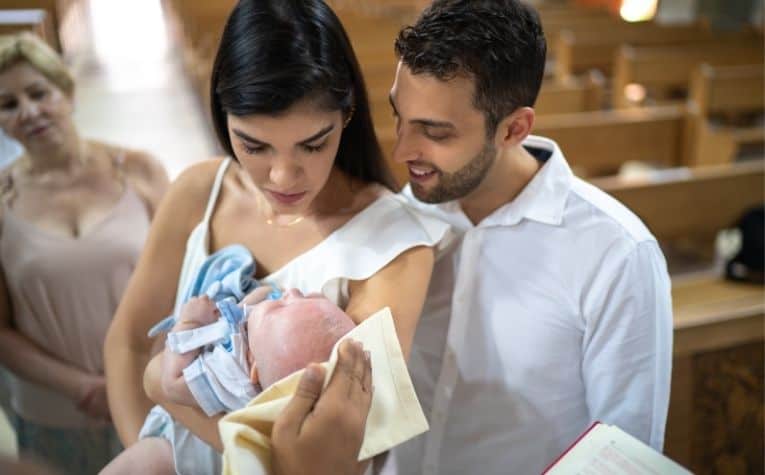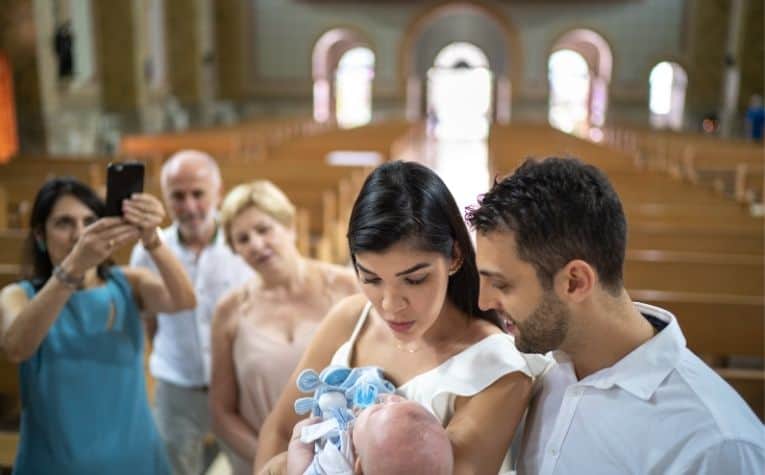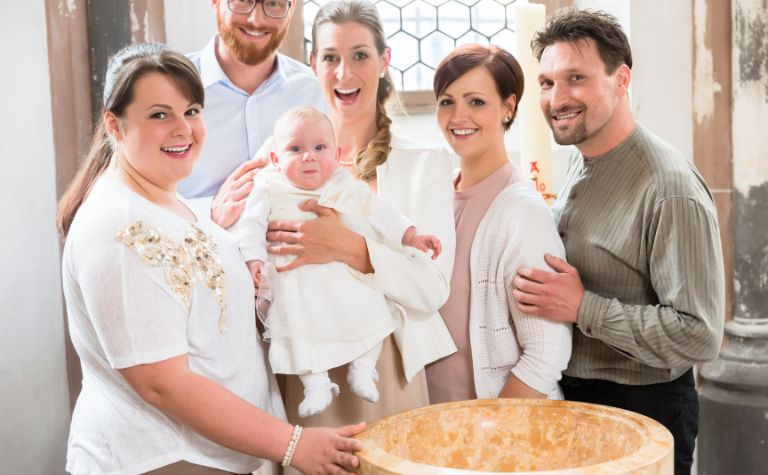Christians take seriously the task of raising their children to follow the ways of God. Several church traditions believe that godparents should assist in a child’s spiritual upbringing. Because various Christian traditions approach this role differently, some might wonder if a Lutheran can be a Catholic godparent.
Lutherans are not allowed to be Catholic godparents. Only baptized Catholics regularly attending Mass and practicing their faith may fill this role. Non-Catholics, including Lutherans, may attend and witness the ceremony and play an essential role in the child’s life, but not as godparents.
What is the rationale behind prohibiting non-Catholics from taking on the responsibility of being a godparent? Does the Lutheran church have similar parameters? Read on to learn answers to these questions and others.

Why Can’t Non-Catholics Be Godparents?
The Roman Catholic church has unwavering qualifications for who can be a godparent because they traditionally play an essential role in raising children.
The godparents of a Catholic infant must be Catholic according to Canon Law: [A godparent must] “be a Catholic who has been confirmed and has already received the holiest sacrament of the Eucharist and who leads a life of faith in keeping with the function to be taken on.” (Canon Law 872, emphasis added.) See all the qualifications at the end of his page.
In Catholic teaching, a godparent’s job begins at a child’s baptism. Godparents, the church identifies as “sponsors” in Catholic canon law, protect the soul of a child and promise to assist the parents in the upbringing of the child in the Catholic faith. (Also see Do Lutheran Churches Have Priests?)
Baptism for a Catholic is not merely symbolic. It is a requirement for salvation. When a priest baptizes an infant, God frees the child from sin, implants in them the character of Christ, and joins them to the church body. Somewhat mysteriously, the child then possesses faith in God. (Also see Do Lutherans Believe You Can Lose Your Salvation?)
What Do Godparents Do?
The job of godparents is to help ensure that the child remains in good standing in the church and has a right relationship with God until the day of their confirmation.
During confirmation, the priest anoints the adolescent with oil, and the child receives the full outpouring of the Holy Spirit. [1]
Because baptism and confirmation play an essential role in a child’s life, godparents must have the same belief system as the parents.
Therefore, every baptized child learns the responsibilities of being a Christian, specifically a Catholic. (Also see Lutheran Bible vs. Catholic Bible: What’s the Difference?)
Although the parents are the primary educators of the child’s faith, godparents still provide essential models for the child to follow.
Godparents Must Attend Mass
One of the primary requirements for godparents is that they are regularly attending Mass. Godparents model the critical duty of attending Mass in a Catholic’s life.
Mass is where the child will one day receive the Eucharist, an essential means of grace in a Catholic’s spiritual life. (Also see Why Do Lutherans Make the Sign of the Cross?)
Godparents should also be modeling a chaste and moral life. Children must learn the distinction between venial and mortal sins and how to avoid each. In many ways, godparents represent the corporate body of the church.
When a child attends the confirmation ceremony, they are not just continuing their journey of following Christ but also joining a community.
Godparents assist the child in learning the rules and mission of that community. [2] (Also see What Do Lutherans Believe About Mary?)
One Godparent Must Be a Man and One a Woman
In addition to being Catholic, godparents must serve in matching pairs if there are two. This fact means that there should be one man and one woman. At one point in church history, godparents would take on the parenting role in the parents’ death.
This is not the case today. Some godparents treat the role less seriously than current Catholic teaching requires. For them, the position is merely symbolic. (Also see Can Lutherans Marry Non-Lutherans?)

What Role Can Lutherans Have in a Catholic Baptism?
The only role that Lutherans can have in a Catholic baptism is that of a witness. A witness is a baptized person of the Christian faith who is not a Catholic.
This role is fitting for people who care deeply for a child’s well-being but stand outside the community of Catholicism. (Also see Lutherans vs. Episcopalians: What’s the Difference?)
Because Lutherans aren’t practicing Catholics, they can’t provide an example of the specific practices of the church. Witnesses may and should attend church elsewhere but do not model faithful participation concerning Mass. This fact doesn’t necessarily speak poorly of their moral character.
Significant differences in theology and practice separate Catholics from Lutherans. Although witnesses cannot take on the official role of being a godparent, this doesn’t mean that they cannot be influential in a child’s life. Lutherans and Catholics hold much in common. (Also see Lutherans vs. Baptists: What’s the Difference?)
What Non-Catholic Witnesses Can Do
Accordingly, witnesses can model moral behavior, encourage children to pray daily, and treat others with love and respect. They can also speak encouragingly about a child’s upbringing in the Catholic church, even if they do not agree with every point of that upbringing. (Also see Do Lutherans Celebrate Lent?)
The tone and practice of the Lutheran faith share essential similarities with the Catholic faith.
- First, both faiths use a large amount of liturgy, meaning they follow a script during their worship services.
- Second, Lutheranism and Catholicism both practice infant baptism.
- Third, they both embrace many central theological teachings of Christianity, such as the Trinity.
With these things in mind, Lutheran witnesses can still generally support a child in their Catholic upbringing. (Also see Do Lutherans Pray the Rosary?)

Could a Catholic Be a Godparent in a Lutheran Church?
Lutherans are less uniform in their qualifications of who can be a godparent. The Evangelical Lutheran Church in America allows Christians, including Catholics, to be godparents.
Even atheists and agnostics can be godparents, so long as at least one of the godparents is a Christian. (Also see What Is the Most Conservative Lutheran Synod?)
Furthermore, the gender of the godparents does not matter. There could be three female godparents or just one male godparent.
On the other hand, the Evangelical Lutheran Synod, another major Lutheran denomination in the United States, strongly suggests that sponsors (i.e., godparents) should be Lutherans.
Their rationale for the ELS is similar to that of Catholics: Lutheran parents should desire that their child’s godparents share the same core belief system as themselves.
After all, the role of the godparent is to bring up children with correct spiritual teaching and behavior. (Also see Lutheran vs. non-Denominational: What’s the Difference?)
Accordingly, it would be unwise to entrust a portion of their child’s spiritual instruction to someone who, according to them, has flawed theology. Witnesses, however, do not have any set qualifications. [3] [4]
Like Catholicism, godparents begin their role at a child’s baptism, usually as an infant. Lutherans believe that baptism initiates saving faith in the heart of the infant. It is a godparent’s job to assist parents in instructing the child in the ways of the Christian faith. (Also see Do Lutherans Believe in Angels?)
This means teaching and living the ten commandments, attending church faithfully, ensuring the child learns their catechism, and many other duties.
When a child comes of age, they participate in a confirmation ceremony in which they formally declare that they desire to continue in the faith God planted in their hearts at baptism. (Also see Do Lutheran Clergy Wear Collars?)
Requirements For Godparents In the Catholic Church
Canon 872 Insofar as possible, a person to be baptized is to be given a sponsor who assists an adult in Christian initiation or together with the parents, presents an infant for baptism. A sponsor also helps the baptized person to lead a Christian life in keeping with baptism and to fulfill faithfully the obligations inherent in it.
Canon 873 There is to be only one male sponsor or one female sponsor or one of each.
Canon 874 To be permitted to take on the function of sponsor, a person must:
(1) be designated by the one to be baptized, by the parents or the person who takes their place, or in their absence by the pastor or minister and have the aptitude and intention of fulfilling this function;
(2) have completed the sixteenth year of age unless the diocesan bishop has established another age or the pastor or minister has granted an exception for a just cause;
(3) be a Catholic who has been confirmed and has already received the most holy sacrament of the Eucharist and who leads a life of faith in keeping with the function to be taken on;
(4) not be bound by any canonical penalty legitimately imposed or declared;
(5) not be the father or mother of the one to be baptized.
A baptized person from a non-Catholic ecclesial community is not to participate except with a Catholic sponsor and only as a witness of the baptism. [5]
References:
[1] Source
[2] Source
[3] Source
[4] Source
[5] Source
Related Questions
The Lutheran and Episcopalian traditions have profoundly impacted Protestant Christianity in Europe, the United States, and worldwide. Yet, these two branches of the Christian faith have similarities...
The Lutheran tradition is a 500-year-old branch of Protestant Christianity. Non-denominational churches are a fast-growing segment of evangelical Christianity, especially in the United States and...
